Entrepreneurs contemplating a move to Croatia for business ventures are met with an array of prospects that stand out prominently. Croatia’s strategic location within Europe has cemented its status as a prime destination for foreign investments. The country’s infrastructure is continually evolving, its tourism industry is flourishing, and the government is actively fostering business growth. This environment makes it an ideal time for those looking to relocate to Croatia for business purposes. This comprehensive guide aims to illuminate the various facets of Croatia’s investment landscape, facilitating a smoother transition into this dynamic market.
Understanding the Appeal of Croatia as a Business Destination
Croatia has emerged as a remarkable Croatia business destination, attracting entrepreneurs and companies from around the globe. The synergy of scenic landscapes and a rich cultural heritage creates an inspiring backdrop for doing business. One noteworthy aspect is the country’s educated workforce, which contributes to a thriving environment for innovation and productivity.
As the Croatian market dynamics evolve, a growing digital economy paves the way for new opportunities. Government initiatives aimed at boosting investment in various sectors demonstrate a commitment to fostering business development. Entrepreneurs find a welcoming atmosphere, enhancing the overall experience of relocating to Croatia.
- Beautiful natural environments that foster creativity
- Supportive governmental policies for new investors
- Diverse market opportunities across various industries
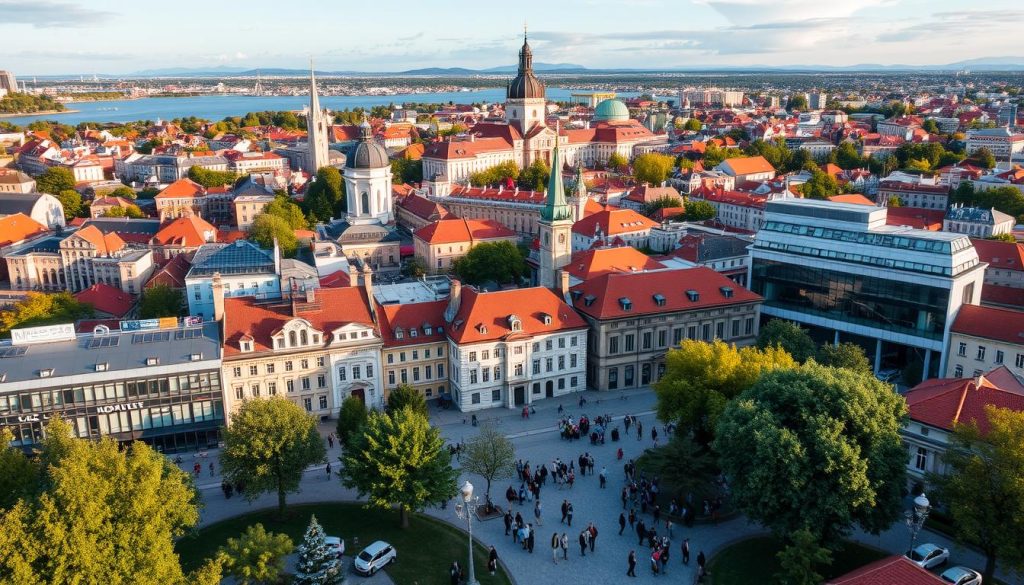
The Benefits of Relocating to Croatia for Business
Embarking on a business relocation to Croatia unveils a plethora of advantages, pivotal for an enterprise’s prosperity. The cornerstone of these benefits lies in the potential for diminished operational costs. Croatia’s modest living costs and accessible office space prices enable businesses to curtail overhead expenses, all while partaking in the country’s dynamic culture and lifestyle.
The nation’s reputation for favourable business conditions creates an auspicious setting for both nascent startups and established corporations. The streamlined administrative frameworks and supportive regulatory environments expedite market entry. Furthermore, the local workforce’s proficiency and multilingualism significantly augment communication and collaboration.
Moreover, the array of Croatia economic incentives proffered to foreign investors is a significant draw. A variety of grants, subsidies, and tax concessions are designed to propel growth in sectors such as technology and tourism. These measures considerably alleviate the financial strain on businesses, enabling them to redirect savings towards innovation and expansion.
The burgeoning entrepreneurial ecosystem in Croatia also presents a wealth of networking opportunities with peers. Entrepreneurs can forge connections with local business luminaries, investors, and innovators, thereby catalysing collaborations that amplify growth prospects. These elements collectively underscore the substantial benefits of relocating to Croatia for business.

Exploring Croatia’s Business Climate
The current Croatia business climate offers a compelling environment for entrepreneurs and investors. Political stability has instilled a sense of security, crucial for those contemplating business ventures. The economic recovery post-COVID-19 pandemic heralds a new era, with burgeoning opportunities across diverse sectors.
The business environment in Croatia is undergoing transformation, propelled by legislation favouring startups and SMEs. This supportive framework encourages innovation and creativity, positioning Croatia as an attractive destination for business establishment. The Croatian government’s initiatives aim to streamline business creation, thereby enhancing operational ease.

As Croatia cements its role within the European Union, analysts foresee improved trade relations. This advancement promises to simplify market access, benefiting foreign entities considering relocation. Such a scenario opens up lucrative markets while operating within a stable, progressive business milieu.
Croatia Investment Opportunities for Entrepreneurs
Croatia’s investment landscape is replete with opportunities, particularly in sectors experiencing exponential growth within its burgeoning market. The tourism sector, bolstered by the country’s breathtaking landscapes and profound cultural heritage, stands out as a prime focus area. Recent data indicates a significant increase in tourist arrivals, fuelling demand for investments in hospitality and leisure infrastructure.
The technology sector also commands attention, with a burgeoning start-up ecosystem that offers a dynamic environment for entrepreneurs. Tech ventures are drawing interest from both local and international investors, facilitating business growth. The government’s proactive stance on innovation underscores the sector’s importance, positioning technology as a critical investment area in Croatia.
Renewable energy presents another compelling opportunity. Croatia’s dedication to sustainable development fosters projects utilising solar, wind, and hydro resources. Such investments not only promise substantial returns but also align with global environmental objectives.
The agricultural sector remains a cornerstone, with fertile land ideal for organic farming and the production of premium goods. Entrepreneurs can capitalise on ventures in organic products and local food markets, catering to consumer preferences for sustainability and health.

Businesses in these sectors benefit from growing investor interest, bolstered by EU funding for development. Recognising Croatia’s potential, entrepreneurs can strategically position themselves for success in this evolving market.
Croatia Tax Incentives: What You Need to Know
Croatia presents a plethora of tax incentives, significantly enhancing the profitability of businesses. The corporate tax environment offers diverse opportunities, thereby attracting foreign investment. Grasping the nuances of company tax rates in Croatia is crucial for evaluating business operations effectively.

- Special Economic Zones (SEZs): These zones offer reduced tax rates and various exemptions to encourage enterprise development in specific regions.
- Tax deductions: Businesses can benefit from various deductions which impact their overall tax burden, making operations more viable.
- Reduced company tax rates in Croatia: Startups may qualify for lower rates, particularly within certain sectors considered vital for the country’s economic growth.
The tax benefits for businesses in Croatia extend beyond local entities, appealing to international companies looking to expand. The Croatian government continually strives to enhance tax frameworks, supporting business growth and innovation. This fosters an environment conducive to success.
Croatia Company Formation: A Step-by-Step Guide
Embarking on the journey of establishing a business in Croatia necessitates a thorough understanding of the intricacies involved. The process of company formation in Croatia is paramount for achieving success in this endeavour.
The initial phase involves selecting the most suitable legal framework for your enterprise. Options range from limited liability companies (d.o.o.) to joint-stock companies (d.d.). Each entity comes with its own set of stipulations and implications, necessitating meticulous research.
Following the selection of a legal structure, the subsequent step entails the compilation of requisite documentation. This typically includes:
- A comprehensive business plan detailing your objectives
- Identification documents for all stakeholders
- Confirmation of a registered business address within Croatia
- Bank confirmation of the initial capital deposit
Subsequent to this, registration with the Croatian Court Register is imperative. This act formally establishes your business entity. Post-registration, acquiring a tax identification number from the tax authority is obligatory.
It is crucial to avoid overlooking critical details during the formation process. Common errors include insufficient documentation or neglecting to register with local authorities. To mitigate these risks, seeking counsel from local legal professionals or business advisors is advisable. They can offer bespoke guidance, tailored to your specific needs.

Setting Up Office Space in Croatia
Delving into the realm of setting up a business location in Croatia necessitates a thorough comprehension of the acquisition process for appropriate office space. The Croatian property market proffers a spectrum of choices, ranging from conventional offices to avant-garde co-working environments.
In metropolitan hubs such as Zagreb and Split, the variability in rental costs is pronounced, influenced by the locale and the nature of the space. Premises situated in central locales typically incur higher rental fees, making them prime for enterprises that benefit from high foot traffic. Conversely, opting for office space in less populated areas can yield more economical alternatives without compromising on vital amenities.
Before making a definitive choice, it is imperative to weigh the advantages and disadvantages of various office settings. Key considerations include:
- Co-working Spaces: Offers flexibility in lease terms, facilitates networking, and provides access to shared resources.
- Traditional Office Leases: Provides dedicated space, allows for branding personalisation, and may offer long-term cost advantages.
For entities seeking a collaborative atmosphere, co-working spaces emerge as a compelling option. Conversely, traditional leases present a stable foundation, enabling bespoke office configurations tailored to specific business requirements. The decision hinges largely on the enterprise’s operational ethos and the envisioned team dynamics.
In conclusion, office space in Croatia offers a myriad of prospects for businesses. A meticulous evaluation of your operational needs, coupled with an exploration of diverse locales, will guarantee the identification of an optimal environment conducive to growth and prosperity.

Croatia Foreign Company Registration Process
The process of registering a foreign business in Croatia encompasses a series of legal procedures, fundamental for adhering to local regulatory frameworks. Grasping these steps can significantly streamline the registration process, thereby enhancing your prospects of success. The initial phase typically involves the selection of a business entity, with options spanning from limited liability companies to joint-stock companies.
Following the selection of your entity, the subsequent critical step in the Croatia foreign company registration process is the preparation of requisite documentation. This entails furnishing proof of identity, a comprehensive business plan, and specifics regarding the company’s operational framework.
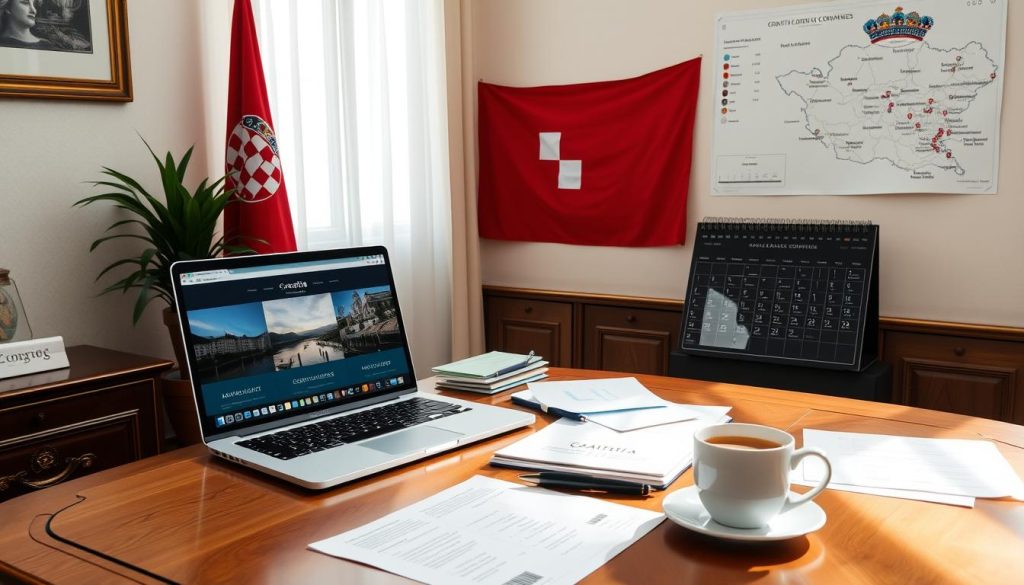
The involvement of local chambers of commerce is also pivotal. These entities offer indispensable support and guidance, ensuring compliance with regulatory stipulations. Engaging with them can provide insights into local business norms and expectations.
- Understanding the specific legal procedures in Croatia for foreign investors is critical.
- Gathering required documentation and compliance with local regulations streamlines registration.
- Consulting Croatia’s chamber of commerce facilitates smoother navigation through the process.
Lastly, ensuring a thorough understanding of common regulatory requirements is imperative to avoid potential pitfalls. Adherence to these guidelines establishes a robust foundation for your business operations in Croatia, affording you peace of mind as you commence your entrepreneurial venture.
Navigating Croatian Business Culture
Grasping the subtleties of Croatian business culture is paramount for those contemplating a career in Croatia. This ethos prioritises personal connections, trust, and respect. Cultivating robust relationships with colleagues and clients can catalyse more productive collaborations and successful negotiations.
The communication paradigm in Croatia is characterised by directness yet politeness. It is crucial to maintain eye contact and exhibit active listening during interactions. Such actions convey respect and genuine interest, which are fundamental to business etiquette in Croatia.

Patience is paramount in negotiations. Croatian business professionals often favour deliberation to ensure comprehensive consideration of all aspects. It is advisable to eschew hasty decision-making. Instead, concentrate on showcasing unwavering commitment and seriousness in your objectives.
- Be punctual for meetings; timeliness is greatly appreciated.
- Dress appropriately; a formal appearance can enhance credibility.
- Engage in small talk before delving into business matters to break the ice.
In conclusion, acclimatising to the complexities of Croatian business culture can greatly enhance the prospects of those working in Croatia. By acknowledging the significance of relationship-building alongside effective communication, individuals and entities can forge successful partnerships and flourish in this dynamic market.
Legal Aspects of Doing Business in Croatia
For entrepreneurs aiming to penetrate the Croatian market, grasping the legal framework is paramount. Croatia’s dynamic economy presents a plethora of opportunities, yet, deciphering its regulatory maze for international entities necessitates meticulous scrutiny. Acquaintance with the relevant statutes is imperative for avoiding legal entanglements that could imperil your venture’s viability.
Key legal domains warrant attention, encompassing:
- Labour Laws: Proficiency in the intricacies of employment legislation, encompassing recruitment, employee entitlements, and occupational health and safety, is indispensable for maintaining a legally compliant workforce.
- Consumer Rights: Adherence to consumer protection mandates, encompassing product disclosure and warranty obligations, is obligatory for businesses.
- Data Protection: Observance of data protection legislation, notably the GDPR, is obligatory for entities processing personal data.
Proactive engagement with the legal landscape can facilitate smoother business operations within this distinctive environment. Collaborating with local legal professionals and regulatory bodies is crucial. Such efforts should be aligned with the regulatory framework for foreign entities to promote enterprise growth and longevity.

Croatia’s Startup Ecosystem: Opportunities and Growth
The startup ecosystem in Croatia is experiencing a surge, offering a plethora of opportunities for nascent enterprises. Innovative entrepreneurs are adeptly utilising local resources to forge successful ventures, thereby creating a dynamic environment for novel ideas. Croatia’s geographical position within Europe, coupled with its profound cultural heritage, provides an optimal setting for business expansion.
Several sectors in Croatia have emerged as growth hotspots, notably technology, tourism, and sustainability. The government has been instrumental in cultivating an environment conducive to innovation, launching initiatives that offer financial backing and support to burgeoning companies. Startups can leverage various accelerators and incubators, such as the Entrepreneurship Centre of the University of Zagreb, which supports the development of fledgling businesses.
An abundance of resources and connections broadens the horizons for startups. Local networks and events foster collaboration among entrepreneurs, investors, and mentors. Engaging with these communities not only facilitates partnerships but also imparts crucial insights into the Croatian market dynamics.
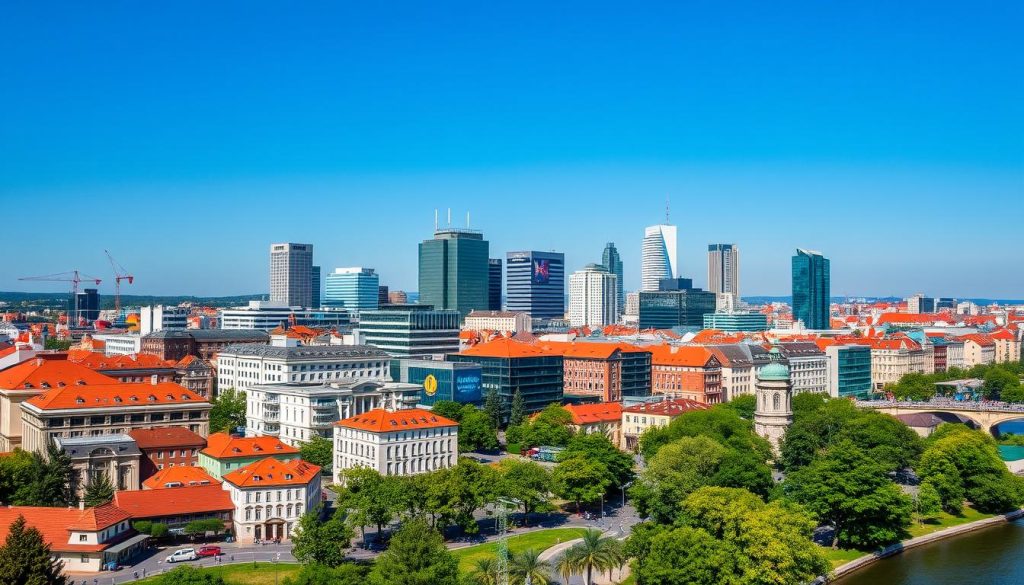
As the startup ecosystem in Croatia continues to mature, both seasoned entrepreneurs and newcomers can anticipate a plethora of opportunities for rapid growth. The synergy of governmental support, a rich talent pool, and an expanding market landscape makes Croatia an enticing hub for startups aiming to leave their imprint. Grasping these opportunities can catalyse significant innovation and economic advancement in the area.
Residency for Entrepreneurs in Croatia
For those contemplating the entrepreneurial journey in Croatia, grasping the nuances of residency requirements is paramount. The residency framework for entrepreneurs in Croatia encompasses a spectrum of permits, each designed to facilitate the establishment of businesses. These permits are meticulously crafted to align with the specific needs and objectives of business ventures.
The initiation of the immigration process for entrepreneurs involves a detailed application, which encompasses the business strategy, financial resources, and projected contributions to the local economy. This process necessitates the compilation of requisite documentation and its submission to the appropriate authorities.
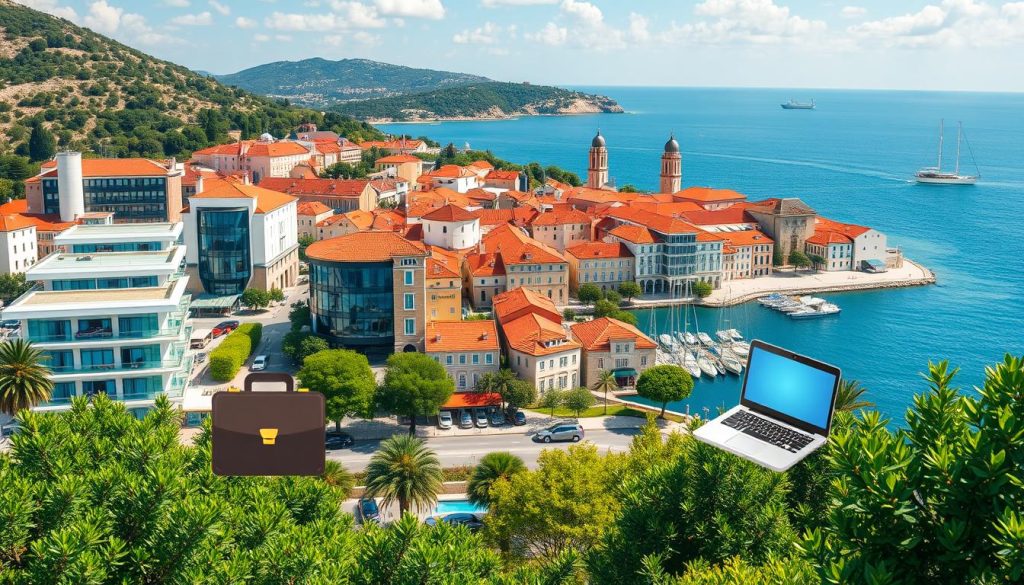
Securing residency not only affords the legal entitlement to reside and operate in Croatia but also unlocks access to public services and ancillary benefits. This environment, conducive to growth, positions Croatia as a prime locale for entrepreneurs aiming to expand their enterprises within the EU.
- Submit a thorough business plan.
- Provide proof of financial stability.
- Meet local authority requirements.
Networking Opportunities in Croatian Business Communities
In the realm of Croatian commerce, networking emerges as a cornerstone for forging enduring business alliances. An extensive array of resources is at the disposal of entrepreneurs, aimed at facilitating connections within the dynamic business ecosystems of Croatia. This environment is conducive to fostering collaborative ventures and entrepreneurial development.
Engagement in local business events stands as a crucial mechanism for entrepreneurs to interact with their peers. These assemblies are crafted to stimulate dialogue and cooperation. Noteworthy events encompass:
- Trade fairs showcasing regional products and services
- Workshops focused on skill development and industry trends
- Networking evenings that encourage informal discussions and introductions
The role of various chambers of commerce cannot be overstated in the networking landscape. These entities serve as conduits for entrepreneurs to connect with their Croatian counterparts, offering both support and access to resources. Membership typically grants access to exclusive gatherings and additional networking avenues.
Furthermore, the advent of online platforms has revolutionised the way entrepreneurs connect with their peers in Croatia. Social networks and professional forums enable the exchange of ideas, knowledge, and potential partnership opportunities. This digital facilitation enhances an entrepreneur’s visibility and fosters engagement with professionals of similar interests, thereby broadening their professional circle.

Through active participation in these endeavours, entrepreneurs can construct a robust local network, essential for thriving in the Croatian market. A focus on cultivating relationships within these business communities can catalyse collaborations that profoundly influence growth and longevity.
Remote Work and Digital Nomad Opportunities in Croatia
The advent of remote work in Croatia has revolutionised the environment for individuals pursuing a flexible lifestyle. This Mediterranean gem boasts breathtaking coastlines and quaint towns, positioning it as a prime destination for digital nomads. Croatia’s rich cultural tapestry and natural splendour serve as a captivating backdrop for remote entrepreneurs.
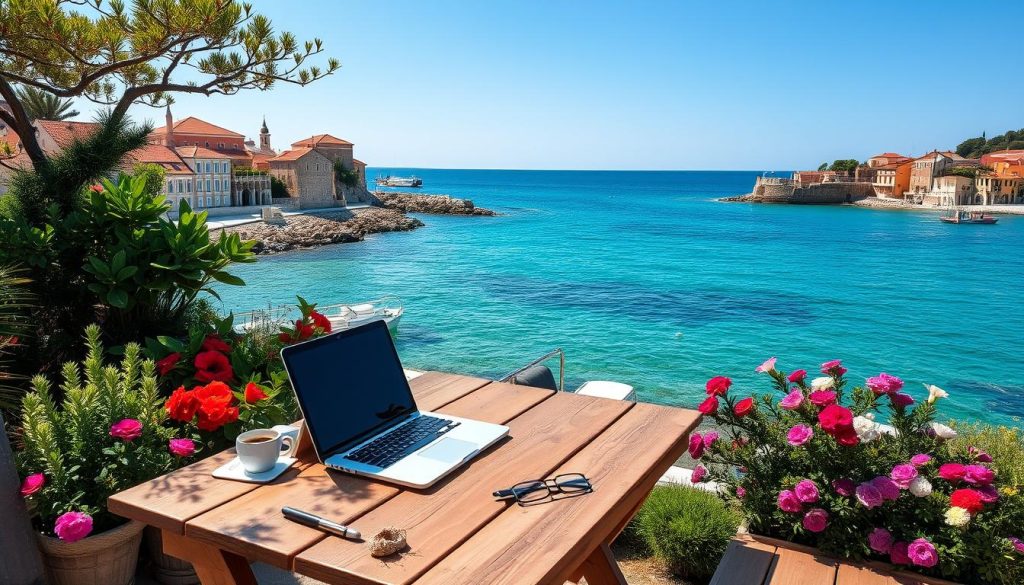
Compared to many Western European nations, Croatia’s living costs are significantly lower, enabling remote workers to maintain a high standard of living without financial strain. The availability of dependable internet and co-working facilities in cities such as Zagreb, Split, and Dubrovnik further enriches the experience for remote professionals.
- A diverse community of like-minded individuals fosters collaboration and networking.
- The mild climate supports outdoor activities year-round, promoting a healthy work-life balance.
- Opportunities for remote entrepreneurs in Croatia continue to grow, with local support and resources available for those starting their ventures.
In conclusion, Croatia’s breathtaking landscapes, supportive communities, and economical living conditions forge a unique setting for those drawn to the digital nomad lifestyle. It stands as an exemplary haven for remote work in Croatia, brimming with opportunities for exploration.
Choosing the Right Location for Your Business in Croatia
The quest for an optimal location for business in Croatia is a pivotal determinant of success. Entrepreneurs must meticulously evaluate various factors, particularly in major urban hubs such as Zagreb, Split, and Rijeka. These cities are frequently regarded as the premier destinations for business in Croatia, thanks to their advanced infrastructures and abundant local resources.
Key regional considerations for Croatian businesses include:
- Industry focus: Different areas may have specific industrial strengths, such as technology in Zagreb or tourism in Split.
- Transport links: Accessibility is crucial. Locations near airports, motorways, and ports offer logistical advantages.
- Access to clients: Proximity to target markets can speed up service delivery and enhance customer relationships.
- Local amenities: Check the availability of facilities such as meeting spaces, hotels, and restaurants that can support business operations.
By carefully weighing these factors, alongside the broader lifestyle and community benefits, entrepreneurs can make informed decisions regarding the location for their business in Croatia.

Success Stories of Businesses in Croatia
Innumerable success narratives from Croatia underscore the adaptability and prosperity of international enterprises within the locale. These thriving entities often embody a blend of resilience and innovation, exemplifying the potential outcomes for entrepreneurs who are willing to immerse themselves in the local market dynamics.
Case studies of Croatian corporations unveil recurring motifs such as community involvement and eco-friendly practices. A paradigmatic instance is Orijent, an eco-conscious startup that converts waste into valuable commodities. Their dedication to ethical business operations has garnered customer loyalty and served as a catalyst for sectoral inspiration.
InfoGenius, a tech enterprise, exemplifies another success story. By relocating to Croatia, it experienced exponential growth, facilitated by the country’s robust support infrastructure for tech startups. This integration into the local environment underscores Croatia’s potential as a hub for technology-driven ventures.

These narratives underscore the vast potential for success within Croatia’s dynamic marketplace. Entrepreneurs contemplating relocation can derive valuable insights from the experiences of these successful entities. By aligning their strategies with local opportunities, they can replicate the success of thriving businesses in Croatia, thereby contributing to the ongoing growth of this vibrant landscape.
Resources for Relocating to Croatia for Business
Entrepreneurs contemplating a move to Croatia’s dynamic business environment will find a plethora of resources at their disposal. These resources are pivotal in providing the necessary information and tools for a seamless transition. Government websites serve as a treasure trove of data on policies and regulations, while support organisations offer invaluable local insights and networking avenues.
Furthermore, relocation guides specifically designed for expats setting up businesses in Croatia are abundant. These guides are replete with practical advice on logistics, legal frameworks, and cultural nuances, rendering them indispensable for newcomers. Engaging with consultancy services, on the other hand, offers a bespoke approach, ensuring that businesses receive customised relocation support that meets their specific requirements.
Lastly, participation in expatriate forums provides an excellent platform for connecting with fellow entrepreneurs who have navigated the same journey. These forums facilitate the exchange of experiences and offer profound insights into the triumphs and tribulations of conducting business in Croatia. By harnessing these diverse resources, entrepreneurs are well-prepared to embark on their ventures in Croatia’s burgeoning market.

